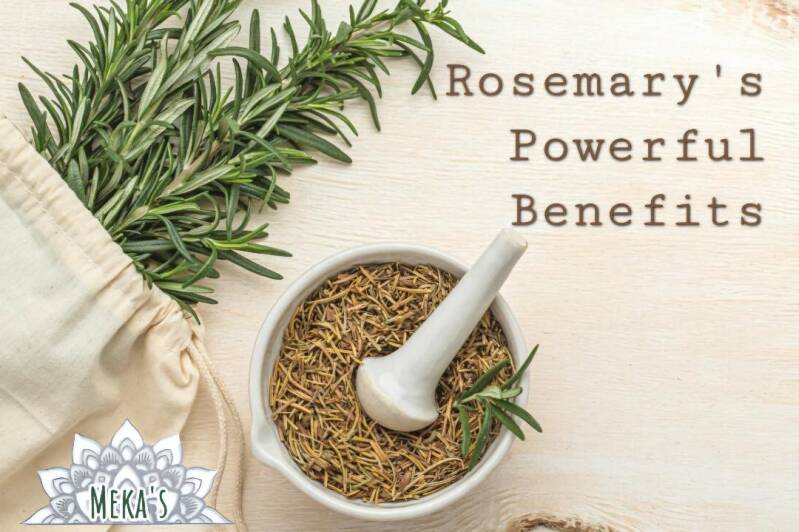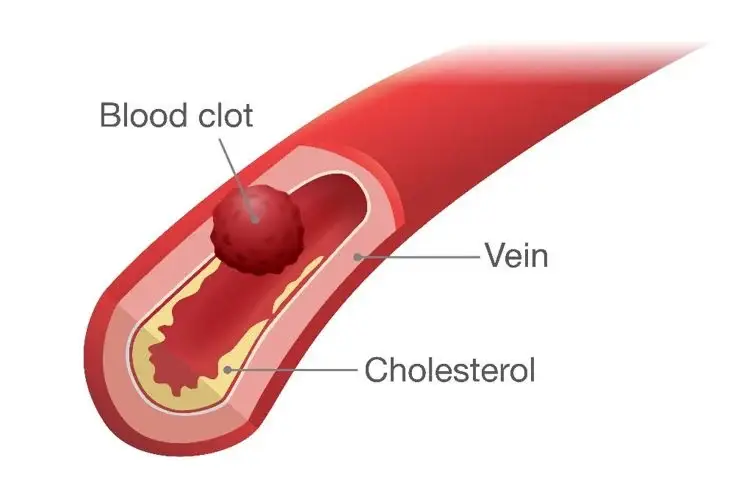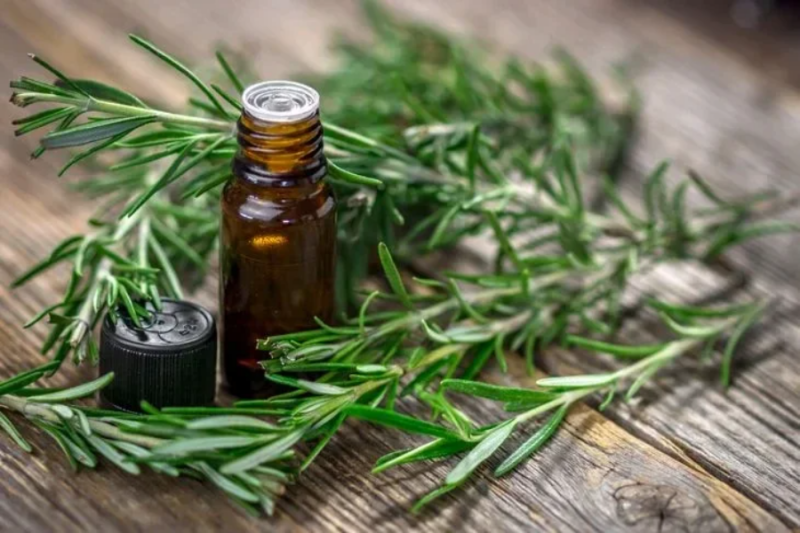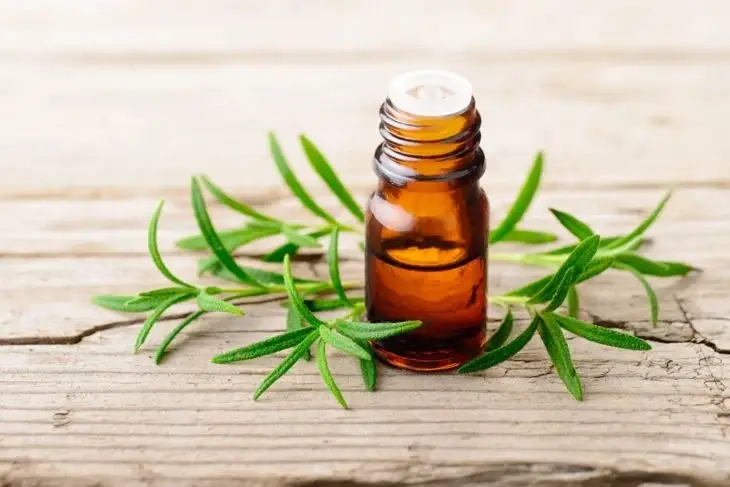
Rosemary is a popular evergreen shrub that is native to the Mediterranean and Those familiar with the culinary world know rosemary is quite popular when it comes to seasoning and garnishing plates. The herb, which has an aromatic scent similar to pine and mint, has been gracing dinner tables and used in cooking all over the world. Its leaves can be eaten fresh or dried, and it is popularly consumed as a tea or infused oil.
The medicinal uses of Rosemary have been praised for centuries, but scientific research has only recently affirmed rosemary as an important addition to the diet. The natural health benefits of rosemary range from relieving body aches to stimulating hair growth. Not to mention, rosemary is packed with nutrients our bodies need to function.
Prevent Blood Clots

Rosemary is high in Manganese, an essential nutrient for metabolic health. Manganese also helps the body to form blood clots, allowing injuries to heal faster. Blood clots are a big problem when it comes to circulation because they can cause blockages that can lead to heart attack and stroke. Blood clots can also cause inflammation. Rosemary is anti-inflammatory and anti-thrombotic, which means can prevent blood clots from developing.
Reduced Risk of Cancer
Unfortunately, many forms of cancer are affecting many parts of the human body in new people every day. Rosemary is a potent antioxidant with anti-inflammatory and anti-cancer properties. Studies suggest it can help slow the spread of cancer cells in the breast, and leukemia. Rosemary contains carnosic acid, a compound known for its powerful antioxidant properties. Carnosic acid can slow the growth of cancer cells in the body and even lower the risk of developing tumors. Also, adding rosemary to foods such as ground beef can help prevent harmful carcinogens that develop during cooking

Support Your Immune System

Rosemary has three active components that can give the immune system a boost: anti-inflammatories, antioxidants, and anti-carcinogenic. Studies have shown that the carnosic and rosmarinic acids in rosemary have powerful antibacterial, antiviral, and antifungal properties. Rosemary can help you to avoid getting sick during times of the year when colds and flu are running rampant. You can add rosemary to tea, especially if you feel a cold coming. Rosemary may also help reduce coughs and the accumulation of phlegm in the respiratory system when you are sick. Consuming rosemary regularly can potentially help lower the risk of infection and help the immune system fight any infections that do occur.
Reduce Stress

Rosemary has been proven to help lower stress and anxiety. It has a positive impact on reducing anxiety and stress. In a randomized trial conducted on university students, rosemary was found to improve the students’ sleep quality and lower their anxiety levels when compared with a placebo. You can diffuse rosemary essential oil and it will have a calming effect on your body. It also has anti-depressant qualities. Consult your doctor before using rosemary as an alternative to traditional medications for anxiety and depression. Every person is different, and rosemary may not work for some.
Boost your Memory & Concentration
Aging is inevitable and is happening to everyone every second of the day, and keeping a sharp brain is important. Rosemary has been used for centuries as a memory aid, and studies in aromatherapy using rosemary have corroborated some of these claims. The powerful mint and pine aroma of rosemary is said to boost our ability to concentrate, focus, and maintain overall brain performance. One study found significant improvements in cognitive performance within 20 minutes of inhaling rosemary essential oil. Rosemary also contains carbonic acid, which attacks free radicals in the brain, and can help prevent and heal brain damage in people who have had strokes. Another reason rosemary should be a part of your daily diet: it could help slow the aging of the brain and potentially prevent Alzheimer’s disease.

Get Your Hair Healthy, Beautiful, & Strong

Rosemary oil is believed to reverse hair loss and promote hair growth in several ways. Rosemary oil has the ability to improve circulation and stimulate nerve growth in the scalp, which can help with a variety of hair problems including hair loss. Studies show the oil in rosemary works better than some alopecia medications. By preventing excess oils on the scalp, rosemary helps keep the skin in this area clean and healthy, which in turn facilitates the efforts of the hair follicles. Rosemary oils may also reduce DHT production. In people with DHT sensitivity, this allows hair follicles to stay in their growing phase longer and prevents hair follicle shrinkage. Finally, rosemary oil may also have anti-inflammatory and antioxidant properties that reduce damage and inflammation to hair follicles. Beyond its potential to promote hair growth, rosemary oil offers several other benefits for the scalp and hair. Its antimicrobial properties can help in combating dandruff and scalp infections, leading to a healthier scalp environment. Additionally, the antioxidant properties of rosemary oil protect hair follicles from damage caused by free radicals and environmental stressors. Rosemary oil also has the ability to strengthen hair, reduce breakage, and improve shine, making it a versatile addition to any hair care routine. Its soothing scent adds a therapeutic dimension, turning hair care into a relaxing ritual. To keep your hair looking healthy and full, try adding some rosemary to your diet by seasoning your dishes or even drinking it with hot water. The oils in the leaves act as a natural disinfectant that protects the scalp from harmful bacteria that adversely affect the hair follicles, keeping your scalp healthy and your hair shiny. A few gray strands? No worries -- rosemary could also prevent premature graying.
Protect Your Skin & Stay Youthful

Rosemary can lend the skin its phytonutrient properties. Just like hair, rosemary offers the same natural disinfectant for skin, helping prevent damage from the sun and free radicals.
- Dealing with stubborn pimples and acne? Rosemary even has natural anti-inflammatory properties that help keep the redness at bay. With its potent antibacterial qualities, rosemary essential oil helps fight the acne bacteria from getting into your pores. This quality, combined with rosemary oil’s non-comedogenic properties, means that acne has no foothold as the oil both clears out pores and forms a protective barrier against future breakouts.
- because it’s a natural astringent, which means it helps shrink pores to tighten the appearance of your complexion. Rosemary extract is great for people with naturally oily skin, as incorporating ingredients like rosemary oil into as many of your skincare products as possible means you multiply these benefits every day for blemish-free skin that looks great.
- Like many other essential oils, rosemary oil is a natural antioxidant, meaning it protects skin against harmful elements in the environment called free radicals that hurt skin cells’ DNA, leading to conditions like fine lines and skin laxity. Whether used topically or ingested in something like tea, the effects of rosemary oil are reported to help prevent many types of premature signs of aging.
- Rosemary oil has diuretic properties, meaning it helps drive fluid out of tissues where it’s applied. This herbal medicine can help with the appearance of under-eye bags that look swollen and puffy by getting rid of fluid retention and easing congestion.
- Cellulite, which can be caused by the accumulation of toxins in the tissues beneath the skin, can be helped with rosemary oil products. Rosemary oil helps stimulate the flow of the lymphatic system’s responsibility of clearing away toxins and waste that harm skin’s ability to regenerate and stay healthy.
- Do you struggle with skin conditions like eczema or rosacea? If so, rosemary oil and other anti-inflammatory essential oils may help soothe the appearance of redness caused by these conditions. Both directly acting as an anti-inflammatory as well as protecting skin with antioxidants and antibacterial compounds, rosemary oil is an all-in-one solution for skin irritation.
Deodorize Naturally

Being human means we come with our own special brand of body odor. Body odor is caused by benign bacteria living on your skin consuming the nutrients you sweat out and that are found in sebum. As an antibacterial essential oil, rosemary oil prevents these bacteria from thriving and releasing odorous compounds. Adding it to hot water makes a powerful natural mouthwash that will kill bacteria responsible for bad breath. The fresh aroma of rosemary can also act as a natural deodorant and is perfect for people looking for natural and chemical-free body products.
Alleviate Pain
Rosemary has some powerful anti-inflammatory properties that can help reduce pain and tissue inflammation, which can lead to joint pain, swelling, and stiffness. Rosemary also has analgesic and anti-neurodegenerative properties., and when added to topical creams can be placed directly on the problematic area. When consumed in foods or as a tea, the herb may help reduce pain associated with migraines, menstrual cramps, and arthritis. Two chemicals in rosemary -- carnosol acid and carnosic acid -- are useful in reducing inflammation.

Powerful Anti-Bacterial

Research has shown that rosemary has the impressive ability to fend off infection, thanks to anti-bacterial and anti-microbial properties. Staph infections are highly contagious and can cause blisters on the body, but rosemary can help prevent contraction of this painful condition and bacteria that can infiltrate the body and lead to illness. It may also be helpful in treating yeast infections. These abilities are due to carnosic and rosmarinic acids in rosemary having powerful antibacterial, antiviral, and antifungal properties. Consuming rosemary regularly can potentially help lower the risk of infection and help the immune system fight any infections that do occur.
Rich in B6
Rosemary is a good source of vitamin B6, also known as pyridoxine. Vitamin B6 is extremely useful in regulating hormones. It plays a big role in keeping mood high and helps lower stress by encouraging the production of serotonin and norepinephrine. Vitamin B6 also helps produce the hormone melatonin, which regulates the internal clock, letting our bodies know when it is bedtime. Being deficient in B6 may lead to cracked skin on the lips, exhaustion, and even mood swings.

Balance Your Hormones

The carnosol in rosemary can help balance androgen and estrogen hormones in the body. If your doctor has diagnosed a hormone imbalance, ask if rosemary may be useful. Aromatherapy is the easiest way to use rosemary to balance hormones. If you choose to use a diffuser, be sure to follow the directions, as excessive amounts can cause a variety of unwanted symptoms.
Rosemary can help balance hormones, especially for women. It can:
- Detoxify estrogens in the liver
- Lower estrogen activity in the body
- Decrease estrogen's ability to cause cancer
- Remove excess estrogen from the body
- Direct estrogen away from the 16 OH pathway and toward the 2OH route
Keep Your Gut Healthy

The gut can be sensitive, and it is important to take note of what your stomach can handle. Rosemary has several potential benefits for gut health, including:
- Adjusting gut bacteria
- Reducing inflammation
- Supporting good gut bacteria
- Encouraging bile flow
Adding rosemary can help alleviate troubles such as indigestion, irritable bowel syndrome (IBS), and even ulcers. Ulcers are caused by the bacteria H. pylori, but thankfully, rosemary can prevent the growth of this bacteria. The herb also fights other bacteria known to cause IBS and colitis, a chronic inflammatory disease in the digestive tract. Rosemary is also a good source of vitamins and minerals, including calcium, potassium, magnesium, phosphorus, and vitamin A. It can be used to add flavor to many dishes, and it's a good choice for low-sodium diets because it doesn't cause water retention.
Detox Your Liver
Rosemary is rich in phytochemicals, which may help with disease fighting and overall health. Rosemary also contains pantothenic acid, niacin, thiamin, folate, and riboflavin. The liver's job is to detoxify the body, getting rid of all the unneeded and harmful things that are ingested or absorbed throughout the day. It also filters the blood from the digestive tract before sending it back out through the rest of the body. Rosemary helps lower the risk of type 2 diabetes and cirrhosis, scarring of the liver tissue that accompanies liver disease. Rosemary can also speed liver recovery. However, people with a history of liver disease should not consume rosemary tea without medical supervision.

Links to my favorite Rosemary products
As usual always consult a professional before jumping into any supplementation and always error on the side of caution! If you are considering taking rosemary as a concentrated supplement please speak to your healthcare team first, as all supplements come with cautions, contra-indications, and interactions. Please consider these warnings, Cautions - high doses may cause digestive upsets. Contra-indication includes pregnancy and possible medical interactions include blood thinning drugs, ACE inhibitors, diuretics, and lithium.




Add comment
Comments